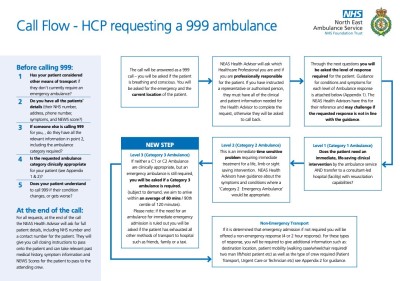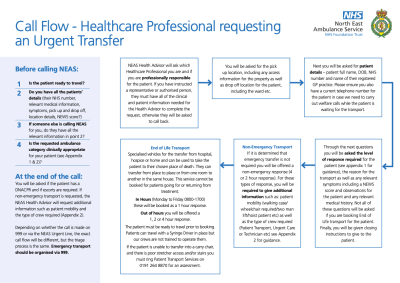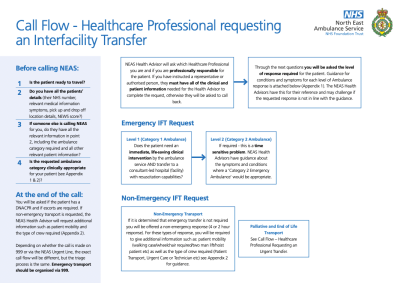Following feedback from GPs and healthcare professionals, we introduced a new improved process for taking healthcare professional (HCP) requests for emergency and urgent transport in 11 September 2023.
The change aims to improve the availability of resources for those patients in the community who have called 999 and require immediate support to a potential life, limb or sight risk.
Health advisors now arrange emergency or urgent transport for patients according to their clinical need at the time of the call to 999 to ensure all patients have the most clinically appropriate transport arranged for them.
As part of this change, we introduced a new Category 3 emergency ambulance, which aims to send an ambulance within 60 minutes.
If you have instructed a representative or authorised person, they must have all of the clinical and patient information needed for the health advisor to complete the request, otherwise they will be asked to call back.
Where the patient does not require immediate emergency admission, please consider other transport options, such as family, friends or a taxi, before calling 999.
Depending on the severity of the patient’s condition, health advisors will arrange either:
1. Emergency ambulance
- Category 1 (within 7 minutes)
- Category 2 (within 18 minutes)
- Category 3 (within 60 minutes)
2. Non-emergency ambulance
- transport within 2 or 4 hours
- a request to consider alternative transport via the patient’s friends and family, where clinically safe to do so
Here are some examples of symptoms or conditions for Category 1 and 2 responses (please note, these are not exhaustive lists)
Category 1
- Cardiac arrest
- Choking
- Fitting now
- Life-threatening asthma
- Anaphylaxis
- Ante- or post-partum haemorrhage.
- Declared obstetric emergency from a community midwife or birth unit
- Cardiovascular collapse (including septic shock)
Category 2
A problem where time-sensitive intervention is required to save the individual’s life, limb or sight. i.e major trauma, heavy blood loss, neurological and vascular emergencies. Conditions such as those below with acute onset or evidence of significant deterioration:
- Suspected aortic aneurysm
- Suspected heart attack/MI
- Suspected stroke
- Suspected sepsis, septicemia, meningitis
- Major trauma
- Heavy blood loss
- Neurological and vascular emergencies
- A COVID-19 case with oxygen saturations below 93%
- A National Early Warning Score (NEWS) of 7 or more
- This means any other clinical problem that requires a time-sensitive response.
- Vascular emergencies (e.g. limb ischemia)
- Unstable cardiac conditions (e.g. arrhythmia)
- Suspected pulmonary embolus (PE) with respiratory distress
- Acute pancreatitis
- COVID-19 related oxygen desaturation
- Labour complications
- Major gastrointestinal haemorrhage
- Overdose requiring immediate treatment
- Mental health emergency (ABD or risk of suicide)




